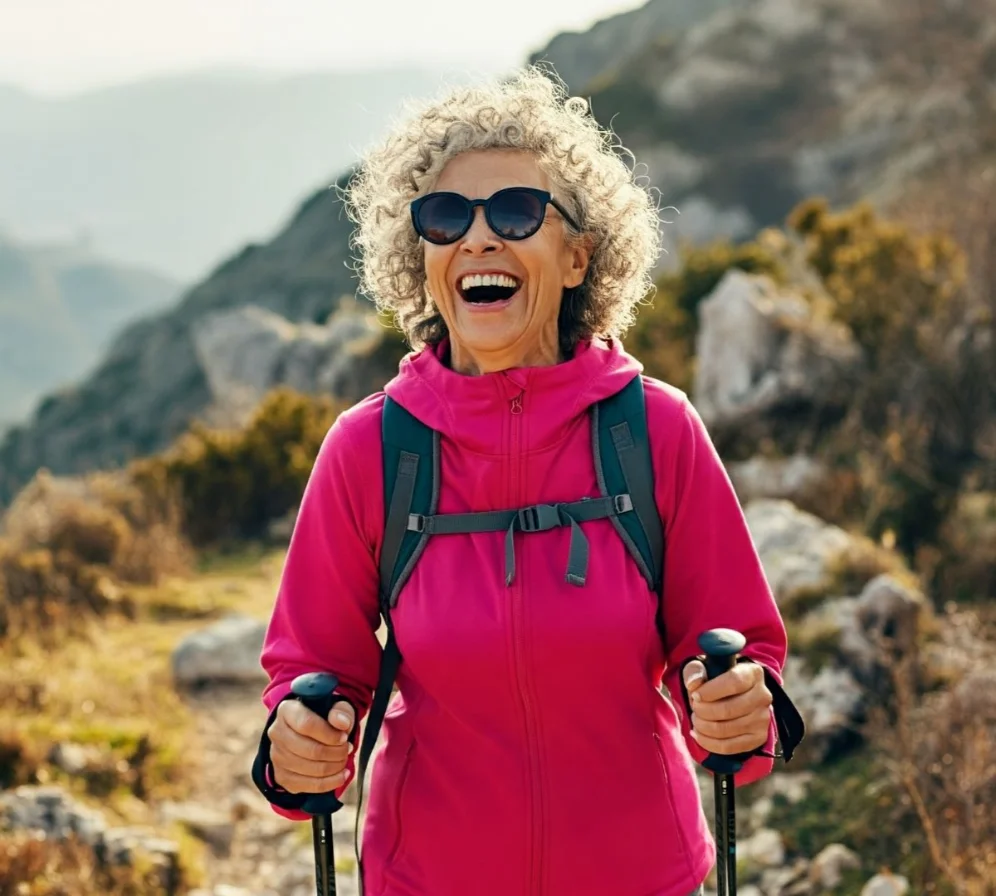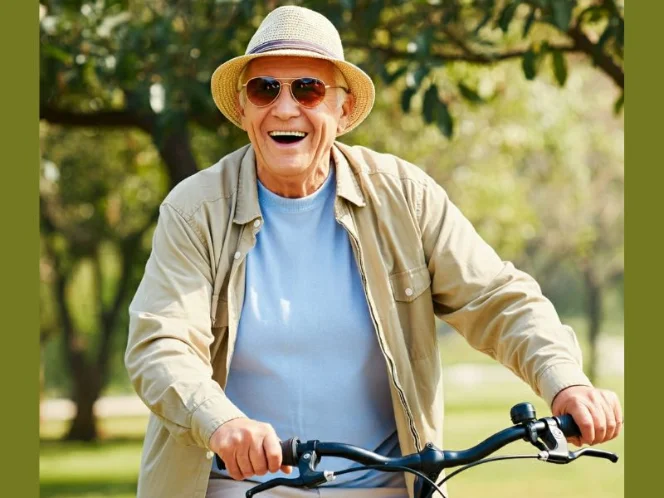
Picture this: Strolling through a sun-drenched park, surrounded by vibrant blooms and the cheerful laughter of friends. Embarking on a scenic hike, feeling the crisp mountain air fill your lungs. Dancing to your favorite tunes, a smile radiating across your face.
These joyful moments aren’t just fleeting experiences – they’re the embodiment of a vibrant, active life, accessible at any age.
Defying the Age Myth
Gone are the days when exercise was solely associated with youth and athleticism. The truth is, regular physical activity becomes even more vital as we journey through our golden years. It’s the key to maintaining independence, preserving health, and embracing life to the fullest.
Unlock a World of Benefits
Imagine a life where aches and pains fade into the background, replaced by a sense of strength and vitality. Picture yourself confidently navigating daily tasks, free from the fear of falls or limitations. Envision a mind that remains sharp, curious, and engaged, brimming with joy and purpose.
This isn’t a fantasy – it’s the reality that awaits you through the transformative power of exercise.
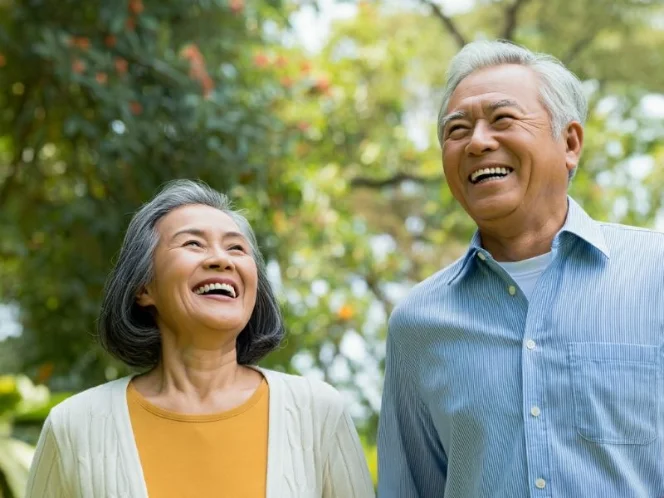
From bolstering your physical health to nurturing your mental and emotional well-being, exercise offers a holistic approach to aging gracefully. It’s time to break free from the misconceptions and discover the countless reasons why exercise is crucial for seniors.
Let’s embark on this journey together, exploring the incredible benefits that await those who embrace an active lifestyle, regardless of age.
Physical Benefits of Exercise for Seniors
While the fountain of youth remains elusive, exercise is the closest we have to a magic elixir for preserving vitality as we age. It’s like a tune-up for your body, enhancing every system and empowering you to live life on your terms.
Improved Cardiovascular Health: A Strong and Steady Heart
Think of your heart as the engine that powers your body. Regular exercise keeps that engine running smoothly and efficiently.
- Aerobic activities like brisk walking, swimming, or dancing get your heart pumping, strengthening it and improving its ability to deliver oxygen and nutrients throughout your body.
- This, in turn, reduces your risk of heart disease, stroke, high blood pressure, and other cardiovascular complications that can often accompany aging.
You’ll also notice a boost in stamina and energy levels, making everyday activities easier and more enjoyable. Say goodbye to feeling winded after climbing a flight of stairs or carrying groceries!
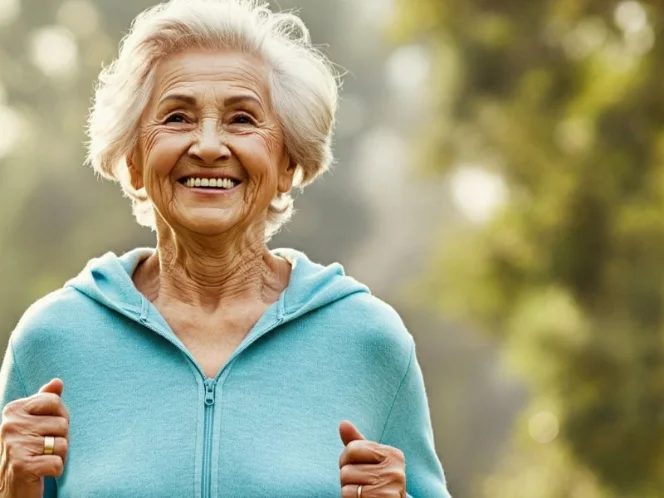
Stronger Bones and Muscles: Building a Sturdy Foundation
As we age, our bones and muscles naturally tend to weaken. But exercise can significantly slow down this process and even reverse some of the damage.
- Strength training, whether it’s lifting light weights, using resistance bands, or simply doing bodyweight exercises, helps build and maintain muscle mass.
- This not only improves your strength and functional fitness but also bolsters your bones, reducing the risk of osteoporosis and fractures.
Improved balance and coordination are additional perks of stronger muscles and bones. This translates to a reduced risk of falls, a major concern for seniors. With enhanced mobility and flexibility, you’ll find it easier to perform daily activities like getting dressed, reaching for objects, and even playing with your grandchildren.
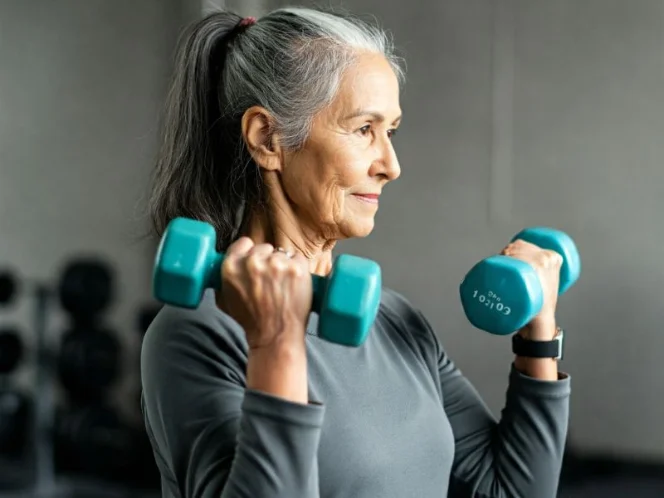
Weight Management: Maintaining a Healthy Balance
Maintaining a healthy weight becomes increasingly challenging as we get older. Metabolism slows down, and hormonal changes can make it easier to gain weight and harder to lose it.
- Exercise plays a vital role in weight management by burning calories and boosting your metabolism.
- Regular physical activity, combined with a balanced diet, can help you achieve and maintain a healthy weight, reducing your risk of obesity-related health problems.
Staying active also helps preserve muscle mass, which is crucial for maintaining a healthy body composition and keeping your metabolism revved up.
Enhanced Immune Function: A Shield Against Illness
A robust immune system is your body’s first line of defense against infections and diseases.
- Regular exercise has been shown to enhance immune function, helping your body fight off illness more effectively.
- This is especially important for seniors, whose immune systems may naturally weaken with age.
Staying active may even reduce the severity of chronic conditions like arthritis, diabetes, and heart disease.
These are just a few of the remarkable physical benefits that exercise offers seniors. By incorporating regular physical activity into your routine, you can build a strong, resilient body that supports an active, fulfilling life.
Mental and Cognitive Benefits: Nurturing a Sharp and Resilient Mind
Exercise isn’t just a workout for your body; it’s a workout for your brain too. Regular physical activity has a profound impact on your mental and cognitive health, helping you maintain a sharp, resilient mind as you age.
Improved Mood and Reduced Stress: A Natural Mood Booster
Life’s challenges don’t disappear as we get older. Stress, anxiety, and even depression can affect anyone, regardless of age.
- Exercise acts as a natural antidote, stimulating the release of endorphins, those feel-good chemicals that leave you with a sense of euphoria and well-being.
- It’s like a mini-vacation for your mind, providing a much-needed break from worries and anxieties.
Regular physical activity has also been shown to be effective in managing symptoms of anxiety and depression, offering a non-pharmaceutical approach to mental health.
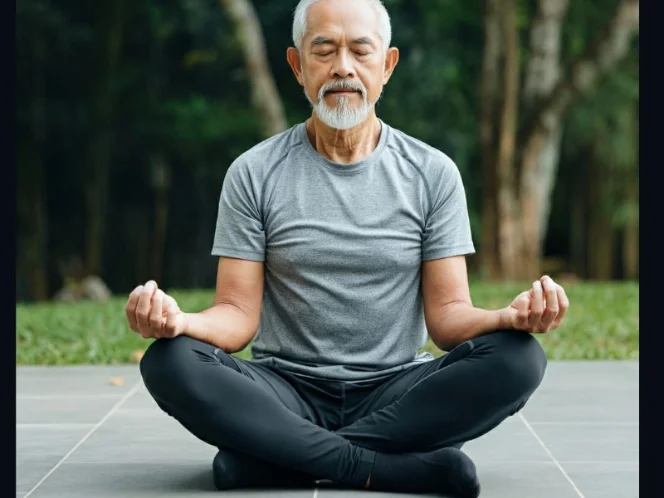
Enhanced Cognitive Function: Keeping Your Mind Sharp
As we age, cognitive decline can become a concern. Memory lapses, difficulty concentrating, and slower mental processing can affect our quality of life and independence.
- The good news is that exercise has been shown to have a protective effect on the brain, potentially delaying or even preventing cognitive decline and dementia.
- It promotes the growth of new brain cells and strengthens connections between existing ones, leading to improved memory, attention, and problem-solving skills.
Think of exercise as a mental gym for your brain, keeping it fit and agile. Engaging in regular physical activity can help you stay sharp, engaged, and mentally active for years to come.
Better Sleep: Restful Nights, Energetic Days
A good night’s sleep is crucial for overall health and well-being, but it can become increasingly elusive as we age.
- Exercise can help regulate your sleep-wake cycle and improve sleep quality.
- By expending energy during the day, you’ll find it easier to fall asleep and stay asleep throughout the night.
Quality sleep not only leaves you feeling refreshed and energized but also supports cognitive function and emotional balance.
Increased Self-Esteem and Confidence: Feeling Your Best
When you feel strong and capable, it radiates outwards.
- Exercise can boost your self-esteem and confidence by helping you achieve physical goals and witness the positive changes in your body and mind.
- You’ll feel a sense of accomplishment and pride in your achievements, which can have a ripple effect on other areas of your life.
Improved body image and a greater sense of self-worth are just a few of the emotional benefits that exercise can bring.
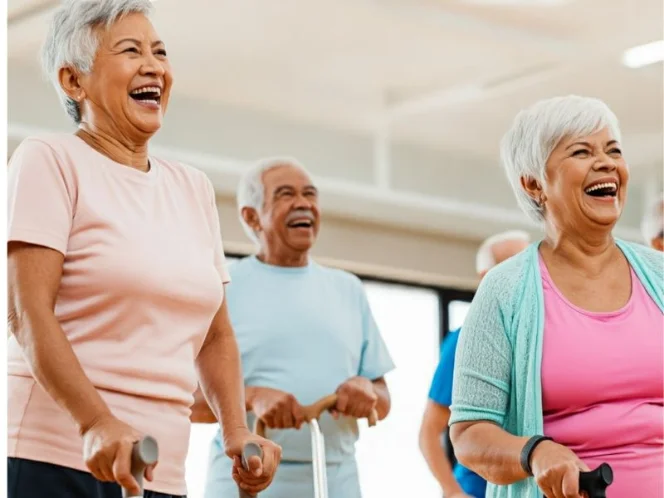
The mental and cognitive benefits of exercise are truly remarkable. By staying active, you’re not just investing in your physical health, but also nurturing a sharp, resilient mind that will continue to thrive throughout your golden years.
Social and Emotional Benefits: Connecting and Thriving
Exercise isn’t just a solitary pursuit – it can be a gateway to a vibrant social life and a deeper sense of purpose, fostering connections and enriching your emotional well-being.
Opportunities for Social Interaction: Building Bonds and Community
As we age, maintaining social connections becomes even more crucial for our overall happiness and sense of belonging.
- Exercise offers a fantastic avenue for social interaction. Joining a group fitness class, participating in a walking group, or even joining a local sports league can introduce you to like-minded individuals who share your passion for an active lifestyle.
- These shared experiences create opportunities for laughter, camaraderie, and lasting friendships, combating feelings of loneliness and isolation that can sometimes creep in as we grow older.

The social connections fostered through exercise extend beyond the gym or fitness studio. You’ll find yourself feeling more confident and outgoing in other areas of your life, leading to a richer, more fulfilling social experience.
Sense of Purpose and Accomplishment: Fueling Your Drive
Setting and achieving goals, regardless of your age, can be incredibly empowering.
- Exercise provides a tangible way to challenge yourself and witness progress over time. Whether it’s mastering a new yoga pose, increasing the weight you can lift, or simply walking a longer distance, these achievements instill a sense of purpose and accomplishment.
This sense of purpose can have a ripple effect on your overall well-being, leading to increased self-esteem, improved mood, and a greater sense of control over your life. It can also motivate you to stay active and continue setting new goals, creating a positive cycle of growth and fulfillment.
Improved Quality of Life and Greater Independence
Ultimately, the social and emotional benefits of exercise translate to a better quality of life and greater independence.
- By staying active and engaged, you’ll find it easier to participate in the activities you love and maintain your independence for longer.
- You’ll have the energy and confidence to travel, spend time with loved ones, and pursue your passions.
The connections you forge through exercise will provide a strong support network, enriching your life with joy, laughter, and shared experiences.
Embrace the power of exercise to not only strengthen your body but also nurture your social and emotional well-being. It’s a journey that leads to a more vibrant, connected, and fulfilling life at any age.
Types of Exercise Recommended for Seniors
Ready to get moving? The beauty of exercise is that it comes in countless forms, each offering unique benefits. Let’s explore some of the most recommended types of exercise for seniors, ensuring you find activities that spark joy and keep you motivated.
Aerobic Exercise: Get Your Heart Pumping
Aerobic exercise, also known as cardio, gets your heart rate up and your blood flowing. Think of it as a rhythmic dance between your body and your breath, a symphony of movement that nourishes every cell.
- Brisk walking, swimming, dancing, cycling, and even gardening are all excellent forms of aerobic exercise.
- These activities improve cardiovascular health, boost endurance, and aid in weight management.
You’ll find yourself breathing easier, feeling more energized, and enjoying a greater sense of stamina throughout your day.
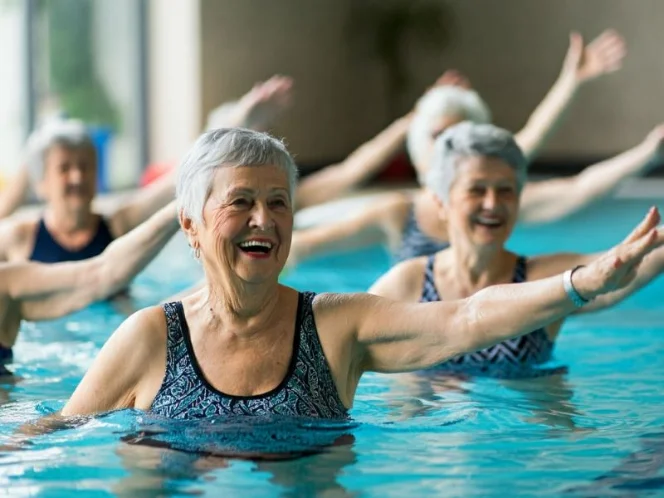
Strength Training: Building a Foundation of Strength
Strength training might conjure images of bulky bodybuilders, but it’s far more accessible and beneficial than you might think.
- For seniors, strength training can involve using light weights, resistance bands, or even just your own body weight.
- These exercises help build and maintain muscle mass, crucial for preserving bone health, improving balance, and enhancing functional strength.
Imagine carrying groceries with ease, rising from a chair effortlessly, and feeling a newfound sense of stability and power in your everyday movements.
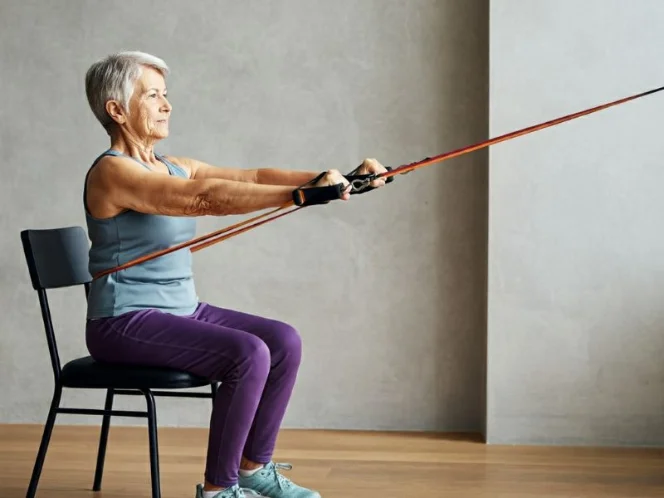
Flexibility and Balance Exercises: Graceful Movements, Steady Footing
Flexibility and balance exercises are like gentle whispers to your body, encouraging suppleness, stability, and a graceful flow of movement.
- Yoga, tai chi, and stretching routines are excellent options for improving your range of motion, reducing stiffness, and enhancing your balance.
- These practices also promote relaxation and mental focus, nurturing a sense of inner peace and well-being.
With improved flexibility and balance, you’ll feel more agile, confident, and less prone to falls, ensuring you can continue enjoying the activities you love.
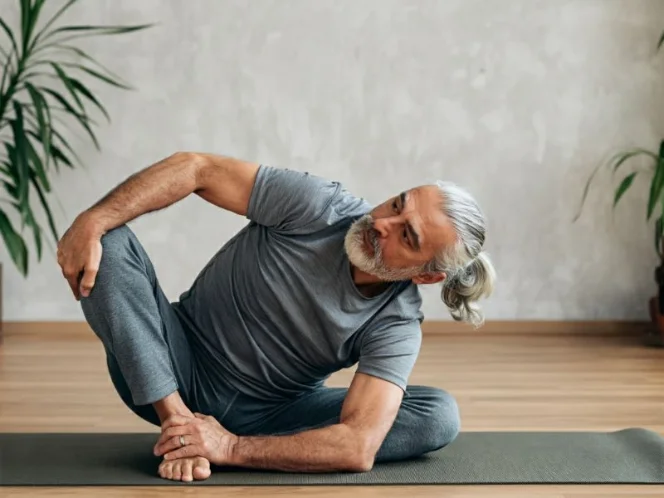
Remember, the best exercise for you is the one you enjoy and will stick with. Experiment with different activities, find what resonates with you, and make movement a joyful part of your daily routine.
Whether you’re dancing in your living room, swimming laps at the local pool, or joining a hiking group, embrace the power of exercise to enhance your physical, mental, and emotional well-being.
Getting Started and Staying Motivated: Your Journey to Lifelong Fitness
Ready to lace up your sneakers and embark on your fitness adventure? It’s never too late to reap the incredible benefits of exercise. But like any journey, it’s important to start with a well-planned route and pack plenty of motivation along the way.
Consult Your Doctor: A Wise First Step
Before diving headfirst into a new exercise program, it’s essential to check in with your healthcare provider. They can assess your current health status, identify any potential limitations or risks, and offer personalized recommendations based on your individual needs.
- This consultation is crucial to ensure your chosen activities are safe and appropriate for your fitness level and any existing health conditions.
- Your doctor might even suggest specific exercises or modifications to help you get the most out of your workouts.
Think of it as a green light from your healthcare team, empowering you to embark on your fitness journey with confidence and peace of mind.
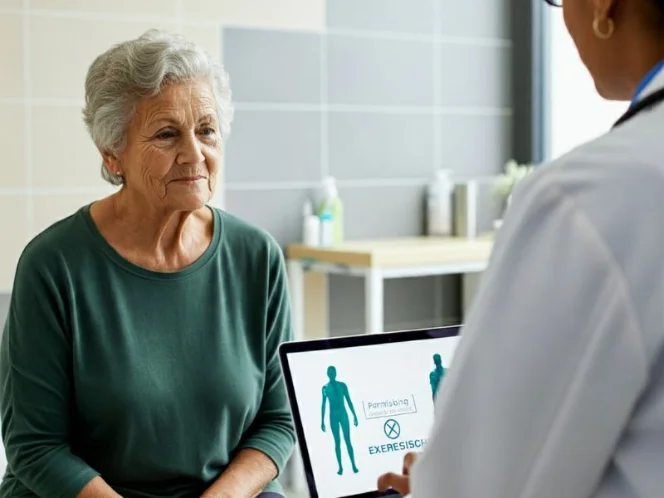
Start Slowly and Gradually Increase: The Tortoise and the Hare Approach
Remember the fable of the tortoise and the hare? Slow and steady wins the race, especially when it comes to exercise for seniors.
- It’s important to start at a comfortable pace and gradually increase the intensity and duration of your workouts over time.
- This allows your body to adapt and minimizes the risk of injuries or burnout.
Listen to your body and pay attention to any signs of fatigue or discomfort. Rest when needed, and don’t be afraid to modify exercises if necessary. Remember, progress is a journey, not a destination.
Find Activities You Enjoy: Make Exercise a Pleasure, Not a Chore
Exercise shouldn’t feel like a chore. It should be something you look forward to, an enjoyable part of your day.
- Explore different activities and find what sparks your interest. Maybe it’s dancing, swimming, hiking, gardening, or even playing with your grandchildren.
- The key is to choose activities that make you smile and leave you feeling energized and fulfilled.
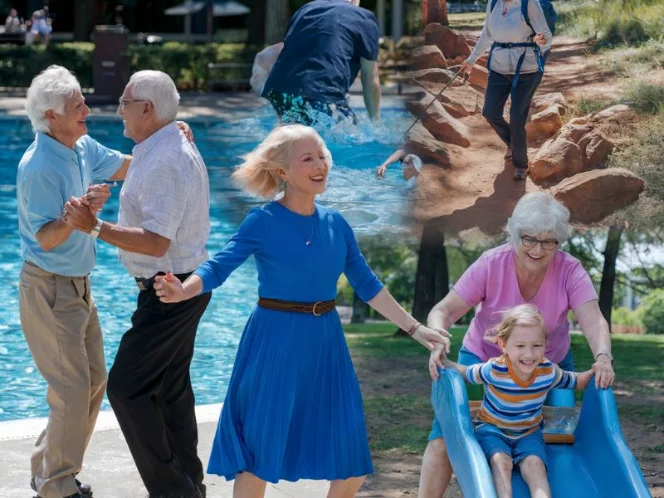
When you genuinely enjoy your workouts, you’re more likely to stick with them and make them a sustainable part of your lifestyle.
Consider Group Classes or a Workout Buddy: The Power of Connection
Social support and accountability can be powerful motivators.
- Consider joining a group fitness class specifically designed for seniors. You’ll enjoy the camaraderie of exercising with peers, learn new skills, and benefit from the guidance of a qualified instructor.
- Or, find a workout buddy who shares your fitness goals. You can encourage each other, celebrate each other’s successes, and make exercise a fun social activity.
Having someone to share the journey with can make all the difference in staying motivated and committed to your fitness goals.
Remember, the key to success is consistency. Make exercise a regular part of your routine, and you’ll reap the countless benefits for your physical, mental, and emotional health.
Safety Considerations: Exercise with Confidence and Care
While exercise is a powerful ally in promoting health and well-being for seniors, it’s important to approach your fitness journey with a focus on safety. By taking a few precautions and listening to your body, you can enjoy the benefits of exercise while minimizing any risks.
Proper Warm-up and Cool-down: Priming and Protecting Your Body
Think of warming up as a gentle invitation to your body, preparing it for the activity ahead.
- It gradually increases your heart rate, loosens your joints, and improves blood flow to your muscles, reducing the risk of strains and sprains.
- A few minutes of light cardio, dynamic stretches, and mobility exercises can make a world of difference in how your body feels during and after your workout.
Cooling down is equally important. It helps your body gradually return to a resting state, preventing dizziness and promoting muscle recovery. Incorporate gentle stretches and light cardio into your cool-down routine.
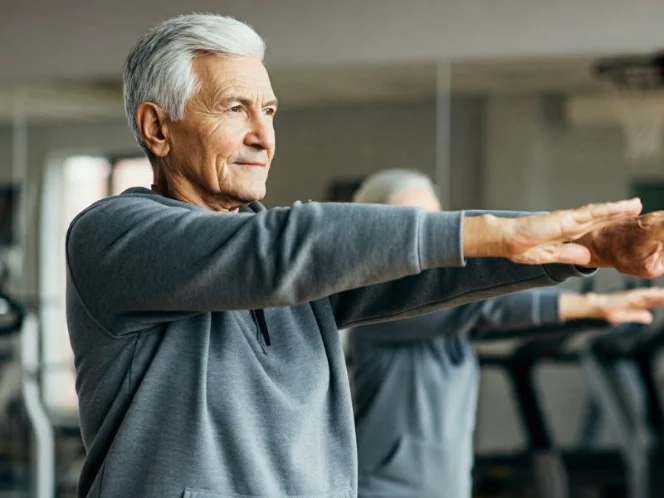
Listen to Your Body: Your Inner Wisdom
Your body is incredibly intelligent and will communicate its needs through various signals.
- Pay attention to any pain, discomfort, or unusual fatigue during your workouts. These are signs that you might need to modify an exercise, reduce the intensity, or take a break.
- Pushing through pain can lead to injuries and setbacks, hindering your progress.
Remember, exercise should feel good and invigorating. If it doesn’t, honor your body’s signals and adjust accordingly.
Stay Hydrated: Quench Your Thirst
As we age, our sense of thirst may diminish, making it easier to become dehydrated.
- Dehydration can lead to fatigue, dizziness, and even heatstroke, especially during exercise.
- Make sure you’re drinking plenty of water throughout the day, especially before, during, and after your workouts.
If you’re exercising outdoors, carry a water bottle with you and sip on it regularly. Don’t wait until you feel thirsty to drink – by then, you’re already mildly dehydrated.
Wear Appropriate Clothing and Footwear: Comfort and Support
The right attire can make a big difference in your exercise experience.
- Choose comfortable, breathable clothing that allows for a full range of motion.
- Opt for supportive footwear that fits well and provides adequate cushioning and stability.
If you have any specific foot or joint issues, consider orthotics or specialized shoes recommended by a healthcare professional.
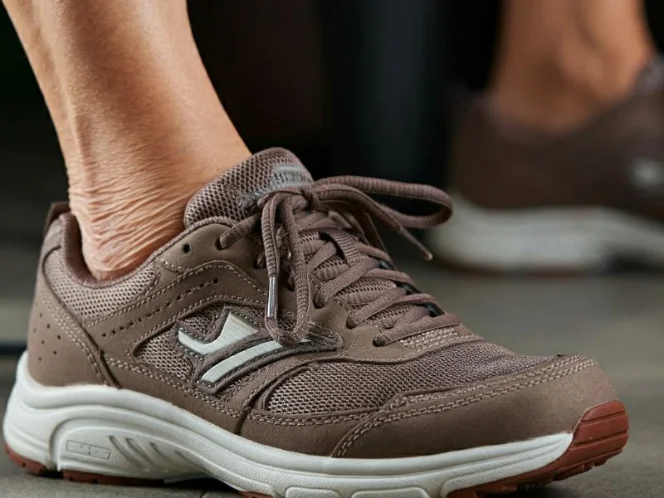
By following these safety considerations, you can exercise with confidence and peace of mind, knowing you’re taking care of your body and minimizing any potential risks.
Remember, exercise is a celebration of what your body can do, not a punishment. Approach it with joy, curiosity, and a commitment to your well-being, and you’ll reap the rewards for years to come.
Conclusion: Embrace Movement, Embrace Life
The journey of aging doesn’t have to be one of decline. It can be a vibrant chapter filled with strength, vitality, and joy. Exercise is the key that unlocks this potential, offering a multitude of benefits that extend far beyond physical health.
- From a stronger heart and bones to a sharper mind and a brighter mood, the advantages of staying active are undeniable.
- You’ll reduce your risk of chronic diseases, improve your balance and coordination, manage your weight, and boost your overall well-being.
But the benefits don’t stop there. Exercise fosters social connections, combats loneliness, and provides a sense of purpose and accomplishment, enriching your life in countless ways.
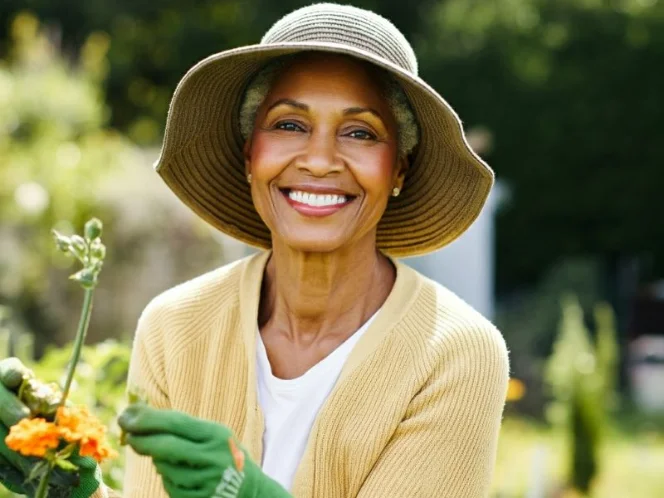
It’s never too late to start. Consult your doctor, find activities you enjoy, and make movement a joyful part of your daily routine. Remember, every step you take, every stretch you make, every laugh you share during a group class is an investment in your health and happiness.
So lace up those shoes, grab a friend, and embrace the transformative power of exercise. Your future self will thank you.

